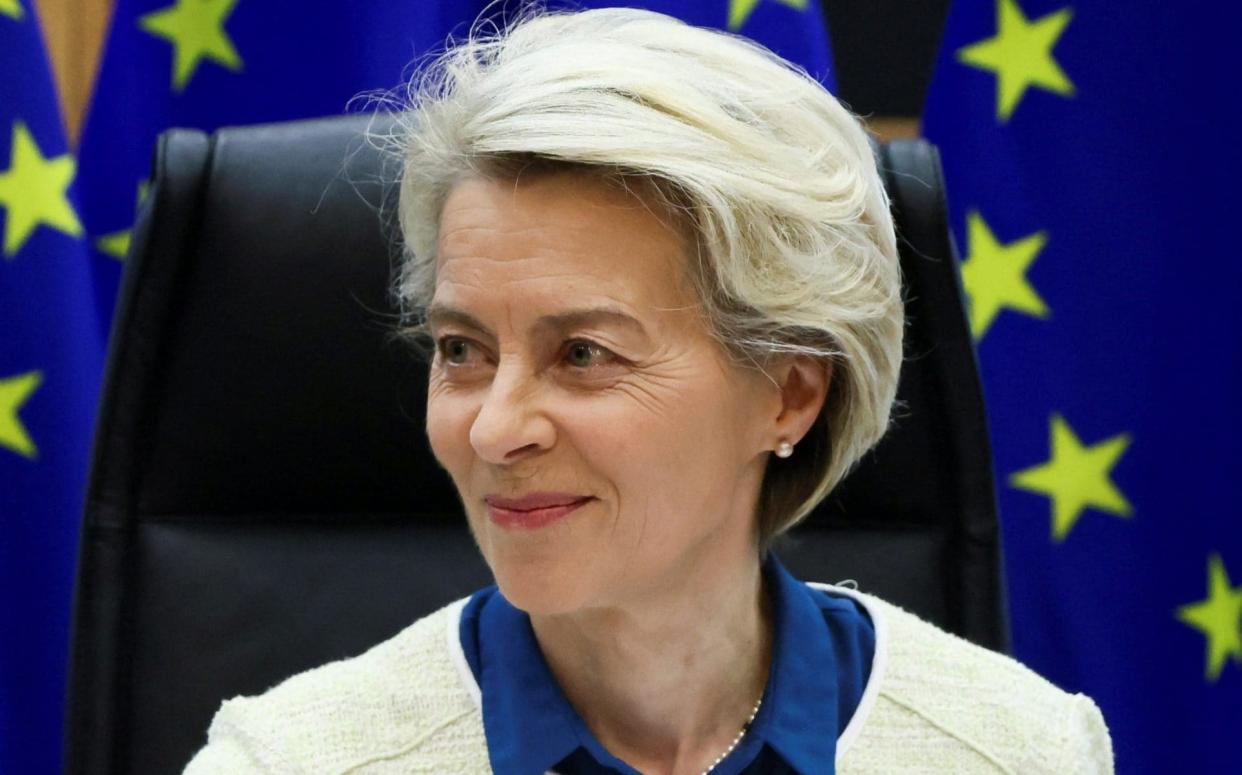EU judges to keep power over Northern Ireland under new Brexit deal, Brussels insists

- Oops!Something went wrong.Please try again later.
European Union judges will continue to have jurisdiction over Northern Ireland under the new Brexit deal on the Irish Sea border, Brussels said on Wednesday.
The European Commission told 27 EU ambassadors gathered in the Belgian capital that it had not backed down over the bloc’s top court despite reports indicating that it had.
The Times reported that the commission had agreed the European Court of Justice could rule on cases only if they were referred to it by Northern Irish courts, rather than taking cases straight to court.
EU sources ruled that out and said the continued supremacy of the ECJ in Northern Ireland was a red line for EU capitals including Paris and Berlin.
“The idea there is a deal or a breakthrough is nonsense,” an EU diplomat told The Telegraph, saying the suggested ECJ compromise was a non-starter. Another source said it was “not true”, while a third dismissed the report as “kite flying” and a fourth also pushed back hard against the claims.
Asked about the Protocol talks in Brussels, Ursula von der Leyen, the European Commission president, refused to be drawn on details of the negotiations, telling reporters: “I have a very trusted and excellent relationship with the Prime Minister. On several occasions, we have been talking also on the issue of the protocol.
“Our teams are working together to find solutions to have, in the very end, an implementation of a common framework. I cannot give partial elements because you never know what, in the very end, the package looks like. But as I said, these are very constructive talks.”
Speaking in the Irish Parliament on Wednesday, Leo Varadkar, the Irish prime minister, said: “I can confirm that, notwithstanding newspaper reports, that no deal has yet been done between the EU and the UK.”

The commission told the ambassadors it was keeping the details of the negotiations close to its chest to prevent leaks. It was confident the source of this leak was in London rather than European capitals.
“Is this Westminster testing the waters towards Belfast and the DUP or trying to leverage negotiations with Brussels?” the diplomat, from a member state, said.
A senior EU official told the envoys there was a more constructive attitude towards the negotiations from the UK than previously. But there is still plenty for the two sides to agree, with talks continuing on the role of the ECJ, state aid, VAT rules and an agreement on animal and plant health rules.
It is understood a deal on customs is close but negotiations are still needed on how proposed “red and green” lanes for goods destined to Northern Ireland only will work.
British sources have also played down suggestions that a protocol agreement is on the point of being clinched. Significant gaps are understood to remain between the two sides.
A Foreign Office source suggested the report of the deal was speculative and said officials were still engaged in “intensive scoping talks” with Brussels.
Ending the supremacy of the ECJ in the country was a key British demand, but Rishi Sunak appears to have accepted there may need to be an arms-length role for the court – likely to anger Brexiteer backbenchers.
‘We are not in the home stretch’
British officials have indicated that the UK could accept a continued but reduced role for the ECJ in Northern Ireland.
Two weeks ago, The Telegraph reported that UK negotiators wanted to insert a layer of protections to prevent the commission from referring disputes straight to the ECJ but would accept it was the final arbiter of EU law in the province.
In the event of a dispute, the commission would be the one to refer the UK to the ECJ, not Northern Irish courts. But before that happened, the UK and EU would discuss the issue and try and resolve it before it got to that stage. Even this would be a difficult concession for the commission to sell to EU capitals.
A possible solution for ending the impasse over plant and animal health checks could involve Brussels and Britain extending the current grace periods in the protocol for a number of years, but this would be seen as a less than ideal compromise because both sides have been pushing for a “lasting solution”.
“If you take small steps you’ll finish the marathon, but we are not in the home stretch,” the EU diplomat said. “Having said that, things could move quickly if there is political will.”
While both London and Brussels insist there is no hard deadline for the protocol talks, both would prefer a deal before the celebrations of the 25th anniversary of the Good Friday Agreement in April.
It is hoped any deal will be enough to convince the DUP to end its boycott of Stormont over the protocol. The DUP has not demanded the end of ECJ jurisdiction in its seven tests for the reformed protocol.
However, European Research Group MPs say the DUP’s demand for the removal of the Irish Sea border implies the end of the supremacy of the Luxembourg-based court.

